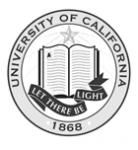
The appeal of Association of Christian Schools International et al. v. Roman Stearns et al. is wending its way through the appeals process, with the University of California system submitting its responsive brief, and a number of organizations submitting amicus curiae briefs, in April 2009. The case, originally filed in federal court in Los Angeles on August 25, 2005, centers on the University of California system's policies and statements relevant to evaluating the qualifications of applicants for admission. The plaintiffs — the Association of Christian Schools International, the Calvary Chapel Christian School in Murrieta, California, and a handful of students at the school — charged that the university system violated the constitutional rights of applicants from Christian schools whose high school coursework is deemed inadequate preparation for college. The defendants prevailed on August 8, 2008, but the plaintiffs promptly appealed the ruling to the Ninth Circuit Court of Appeals.
Although creationism is not the only issue in the case, it is a prominent part of it. The plaintiffs object, inter alia, to the university system's policy of rejecting high school biology courses that use creationist textbooks — Biology: God's Living Creation, published by A Beka Books, and Biology for Christian Schools, published by Bob Jones University Press — as "inconsistent with the viewpoints and knowledge generally accepted in the scientific community." Michael Behe, a proponent of "intelligent design" creationism, served as an expert witness for the plaintiffs, although his defense of the creationist biology textbooks was unavailing. Wendell Bird, one of the attorneys for the plaintiffs, is a former employee of the Institute for Creation Research; he defended Louisiana's 1981 "equal time" act all the way to the Supreme Court, where it was ruled to violate the Establishment Clause in the decision in Edwards v. Aguillard (1987).
In its appeal of the August 2008 decision, filed on January 26, 2009, the plaintiffs asserted that the University of California system "has rejected a large number of biology courses because, despite their standard content, they added a religious viewpoint" (p. 21), which "constitutes viewpoint discrimination, content discrimination, and content-based regulation, which conflict with the First Amendment" (p. 24). In their reply, filed on April 10, 2009, the defendants replied that the courses were rejected because they used the creationist textbooks as their primary texts, and a review of those textbooks "concluded they were inappropriate for use as primary texts in college preparatory science courses due to their characterizations of religious doctrine as scientific evidence, scientific inaccuracies, failure to encourage critical thinking, and overall un-scientific approach" (p. 21) — a judgment with which Donald Kennedy and NCSE Supporter Francisco Ayala, experts for the defendants, concurred.
Two amicus curiae briefs — one from the American Center for Law and Justice, the Catholic League for Religious and Civil Rights, the Common Good Foundation, and the Seventh-day Adventist Church State Council; the other from the National Legal Foundation — have been filed on behalf of the plaintiffs; neither discusses creationism. Four amicus curiae briefs — from the American Historical Association & Organization of American Historians, the American Association of University Professors, the California Council of Science and Technology, and the California State University system and the University of Nevada, Las Vegas — have been filed on behalf of the defendants. Of these, only the California Council of Science and Technology's brief discusses creationism, which is perhaps not surprising, since the brief was coauthored by attorneys from Pepper Hamilton LLP who were part of the legal team representing the plaintiffs in Kitzmiller v. Dover, the 2005 case over "intelligent design" creationism.
The summary of the argument from the California Council of Science and Technology's amicus brief (pp. 3-4) deserves full quotation:
The brief, along with all of the documents mentioned here, is available on NCSE's website, in a special section devoted to ACSI v. Stearns.As a public institution of higher education, UC has the responsibility to produce college graduates who have satisfied its rigorous academic standards in all relevant disciplines, including science. In order to fulfill this responsibility, UC must be allowed to choose among applicants for admission into the UC system based on the applicants' demonstrated understanding of important foundational concepts. In the area of science, two such foundational concepts are the nature of science and the theory of evolution. UC acted appropriately in not giving "d" credit to certain high school science courses that used the Biology for Christian Schools and Biology: God's Living Creation textbooks because these textbooks do not teach either concept in an appropriate manner and in fact advance fundamental misconceptions about both concepts. Students educated with these textbooks will not be adequately prepared for science courses at UC.
The need for high-quality post-secondary science education has never been greater, either in California or the United States as a whole. Science and technology are recognized as key economic drivers. Unfortunately, both California and the United States are losing ground in these critical areas, in large part because of the inability of colleges and universities to produce enough highly qualified science and technology graduates. The prosperity of the state and nation in the 21st century depends on the reversal of this trend and the production of more university graduates well educated in science and technology. In light of this critical need, UC should be encouraged to take all reasonable measures to ensure that the students admitted into the UC system have a solid grounding in foundational scientific concepts upon matriculation.
